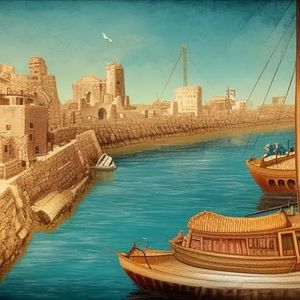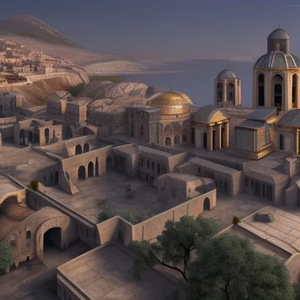Onighus
Onighus is the capital city of Khutu, located at the southern end of the Gusu Sea. Its current population is around 41,000 people. It is best known as the home of the Mausoleum, the political and theological heart of Khutu and the residence of Eluli Ula. Its architecture is typical of the Omban core, with densely-packed marble and stone buildings and domed architecture.
The historical foundation of Onighus is traditionally marked at 143 BE. At that time, Khutu was governed by the Triumvirate, who ruled out of the castle at Amobaghe well to the north and west of Onighus. Its people at the time were speakers of a western dialect of Old Omban. After the triumvirs pledged their fealty to the Omban monarchy in 62 BE, Onighus rose in importance, due to its proximity to the city of Omba and its location right along the south end of the Gusu Sea. In the early part of the Omban Empire, Onighus was made the capital of Khutu province, which entitled it to political rights and a high degree of self-governance, although at time its power was rivalled by Ardukh in the north of the province, where the great Academy was built. In 189 IE, the great Temple of the Voice in Onighus was completed, at the time the largest such temple save the one in Omba itself.
In 334, during the final and tumultuous years of the Empire under the Tirumfegla dynasty, Eluli Ula, foreseeing the chaos that would follow, had himself moved westward from Omba to Onighus. There, adjacent to the great temple of the Voice, he had constructed the Mausoleum, to serve as his residence as well as the seat of power for what would become newly independent Khutu. While initially Eluli's rule faced some resistance from local leaders who had been accustomed to their privileges, Eluli instituted the role of Conduit which would be held by noble Voices and would effectively hold enormous power, thereby stifling the strongest criticism. Onighus became the theological, political, and social heart of a new nation, centered around tradition and faith.
Onighus remains an important trade center today, with both major east-west roads leading to Daligash and Omba, and an excellent harbour that has been improved many times. Agricultural, mining, and maritime goods are produced and transported regularly.

